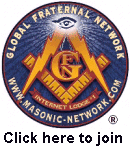
The GFN Treasure Chest Archives
www.masonic-network.com
"Where Master Masons Communicate"

 |
The GFN Treasure Chest Archiveswww.masonic-network.com |
 |

The following is a brief history of this "GREAT MAN and MASON:
First President of the United States; supreme commander of the Contmental forces in American Revolution and "Father of his country." born Feb. 22, 1732 (by present calendar) at Bridges Creek, Westmoreland Co., Va. Inasmuch as his biography is readily available, this sketch will deal only with the Masonic facets of his life.
He was initiated in 1752 in the lodge at Fredericksburg, Va., and the records of that lodge, still in existence, show that on the evening of Nov. 4 "Mr. George Washington was initiated as an Entered Apprentice" and the entrance fee of $2 3s was acknowledged. On March 3, 1753 he received the Fellow Craft degree, and on Aug. 4, same year, was raised to Master Mason. Each of the above days fell on Saturday and he was last in the Fredericksburg lodge on Saturday, Sept. 1, 1753. It is possible that he received some additional degree, or was reobligated during the French War in a military lodge attached to the 46th Regiment. It might have been the Mark Master degree. It is also speculated that he received the Royal Arch degree in Fredericksburg Lodge as it was being worked by that lodge at the time Washington, was raised.
This claim is aided by the fact that in Aug., 1784 Lafayette presented Washington with a Masonic apron which had been embroidered by Madame Lafayette, and contained emblems of the Royal Arch with the letters H.T.W.S.S.T.K.S. in a circle and a beehive within the circle to indicat that it was the wearer's mark.
In 1777 a convention of Virginia lodges recommended Washington to be Grand Master of the Independent Grand lodge of that commonwealth. Washington, however, declined. Soon after the start of the Revolution, there was a movement to throw off the authority of the mother country, and several of the provincial grand lodges assumed an independent character.
The idea of a grand master for all the colonies also became popular. On Feb. 7,1780, a convention of delegates from Army lodges met at Morristown, N.J. and suggested to several grand lodges that "one Grand Lodge in America" be established. On Jan. 13, 1780, the Grand Lodge of Pennsylvania held a session, and declaring that Freemasonry would benefit by "a Grand Master of Masons throughout the United States," they elected Washington for the position. They then sent minutes of the election, to the different grand lodges, but whenWilliam H. Waste Mass. failed to come to any determination on the question, the matter was dropped.
The next Masonic record of Washington is in 1788 when Lodge No. 39 of Alexandria, Va., which had previously been working under the Grand Lodge of Pennsylvania, transferred its allegiance to Virginia. On May 29 of that year the lodge adopted the following resolution: "The Lodge proceeded to the appointment of Master and Deputy Master to be recommended to the Grand Lodge of Virginia when George Washington, Esq., was unanimously chosen Master; Robert Mc- Crea, Deputy Master; Wm. Hunter, Jr., Senior Warden; John Allison, Junior Warden. The charter to the lodge was issued by Edmund Randolph, then governor of Virginia and Grand master of the Grand Lodge of Virginia, and named Washington as master. It also designated the lodge as Alexandria Lodge No. 22. In 1805 the lodge was permitted to change its name to that of Washington Alexandria Lodge in honor of its first master. Washington served in the capacity of master a total of 20 months.
Throughout his career, Washington visited a number of lodges and attended many Masonic functions. His correspondence has many references to Freemasonry. In 1797 he wrote the Grand Lodge of Massachusetts, "My attachment to the Society of which we are members will dispose me always to contribute my best endeavors to promote the honor and prosperity of the Craft." In an earlier letter to the same body he expressed his idea that the Craft's "grand object is to promote the happiness of the human race." In answering a letter from the Grand Lodge of South Carolina in 1791, he said: "I recognize with pleasure my relation to the Brethren of your Society," and "I shall be happy, on every occasion, to evince my regard for the Fraternity." He also referred to the fraternity as "an association whose principles lead to purity of morals, and are beneficial of action."
Writing to the officers and members of St. David's Lodge at Newport, R.I. in 1791 he stated: "Being persuaded that a just application of the principles on which the Masonic fraternity is founded must be promotive of private virtue and public prosperity, I shall always be happy to advance the interests of the Society, and to be considered by them as a deserving Brother." In November, 1798, only 13 months before his death, he wrote to the Grand Lodge of Maryland; "So far as I am acquainted with the doctrines and principles of Freemasonry, I conceive them to be founded in benevolence, and to be exercised only for the good of mankind. I cannot, therefore, upon this ground, withdraw my approbation from it."
This was signed with his costumery flourish. George Washington, Brother.
To our newer Brothers: I would ask you, to read the last few lines again. They state how Washington, rested his faith in the Principles of free Masonry. So mote it be.